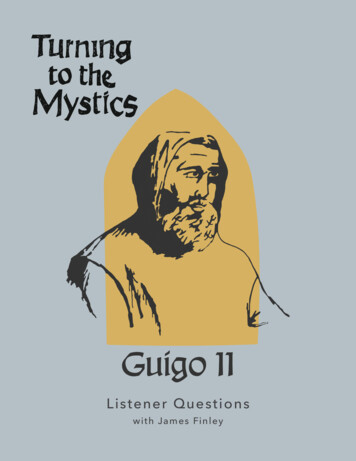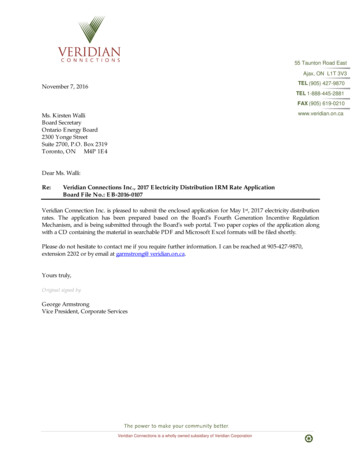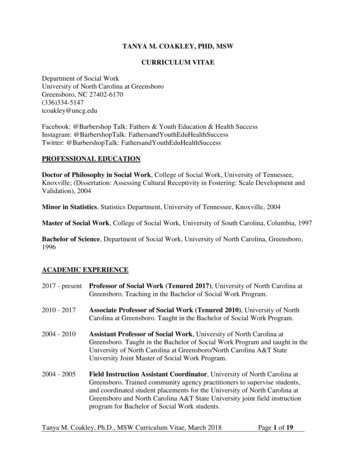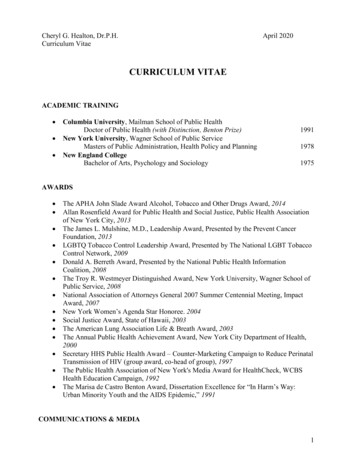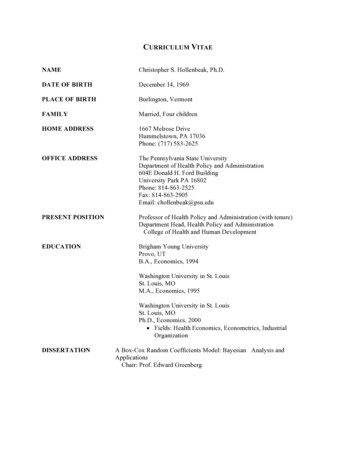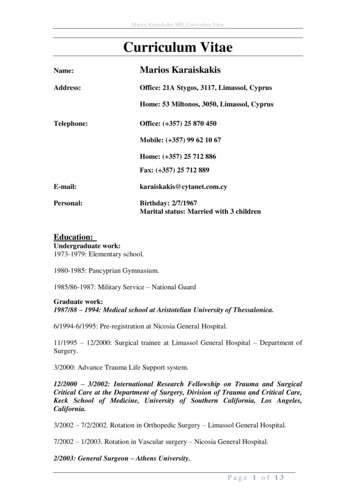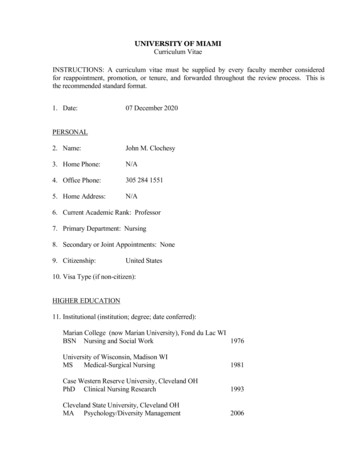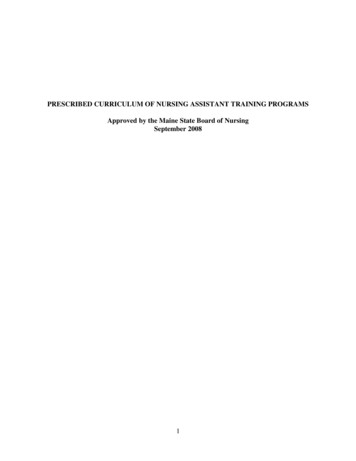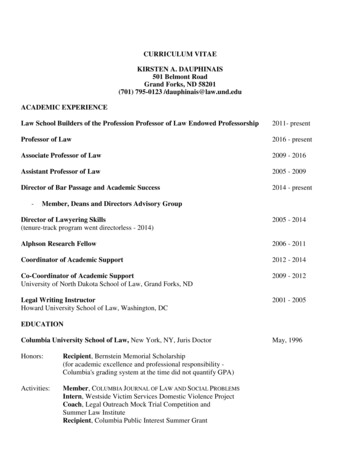
Transcription
CURRICULUM VITAEKIRSTEN A. DAUPHINAIS501 Belmont RoadGrand Forks, ND 58201(701) 795-0123 /dauphinais@law.und.eduACADEMIC EXPERIENCELaw School Builders of the Profession Professor of Law Endowed Professorship2011- presentProfessor of Law2016 - presentAssociate Professor of Law2009 - 2016Assistant Professor of Law2005 - 2009Director of Bar Passage and Academic Success2014 - present-Member, Deans and Directors Advisory GroupDirector of Lawyering Skills(tenure-track program went directorless - 2014)2005 - 2014Alphson Research Fellow2006 - 2011Coordinator of Academic Support2012 - 2014Co-Coordinator of Academic SupportUniversity of North Dakota School of Law, Grand Forks, ND2009 - 2012Legal Writing InstructorHoward University School of Law, Washington, DC2001 - 2005EDUCATIONColumbia University School of Law, New York, NY, Juris DoctorHonors:Recipient, Bernstein Memorial Scholarship(for academic excellence and professional responsibility Columbia's grading system at the time did not quantify GPA)Activities:Member, COLUMBIA JOURNAL OF LAW AND SOCIAL PROBLEMSIntern, Westside Victim Services Domestic Violence ProjectCoach, Legal Outreach Mock Trial Competition andSummer Law InstituteRecipient, Columbia Public Interest Summer GrantMay, 1996
Colgate University, Hamilton, NY, Bachelor of Arts, Political ScienceHonors:Magna Cum LaudeCumulative GPA: 3.74Phi Beta KappaTop 3% of Graduating ClassRecipient, Colgate Alumni Memorial Scholarship (top 5% ofentering class and academic scholarship for full financial need)Recipient, Dean’s Award every SemesterTwo-time Recipient, Paul M. Himmelman Scholarship(for the outstanding Political Science major)Activities:Vice President, College Democrats of Colgate, 1990-92May, 1993PUBLICATIONSKirsten Dauphinais, Quintilian’s Curriculum, NEV. L. J. (2020) (forthcoming)Kirsten A. Dauphinais, Using an Extended Simulation to Teach Interviewing, Counseling, Negotiating, andDrafting in the First Year, 15 TENN. J. BUS. LAW 105 (2013).Cited Favorably by Adam Lamparello & Charles E. MacLean, A Proposal to the ABA: Integrating Legal Writing andExperiential Learning into a Required Six-semester Curriculum that Trains Students in Core Competencies, ‘Soft’ Skills,and Real-World Judgment, 43 CAP. U. L. REV. 59 (2015); Alyssa Dragnich & Rachel H. Smith, An Offer They Can’tRefuse: Teaching Persuasive Writing Through a Settlement Offer Email Assignment, 23 PERSP: TEACHING LEGAL RES. &WRITING 85 (2014)Kirsten A. Dauphinais, Sea Change: The Seismic Shift in the Legal Profession and How Legal WritingProfessors Will Keep Legal Education Afloat in its Wake, 10 SEATTLE J. SOC. JUST. 49 (2011)(special peerreviewed and peer- and student-edited edition of Journal dedicated to conference proceedings from the December10, 2010 Society for American Law Teachers Biennial Conference on Transformative Teaching).Cited in Michele N. Struffolino, Frequently Asked Questions & Answers: Different Skills in First Year d/Different Skills in First Year Courses.pdf; Selected for inclusion inVolume 7 of the Legal writing Institute Monograph Series; Selected for inclusion in special Association of American LawSchools’ 2012 Annual Meeting website on the Future of the Legal Profession and Legal Education: Changes in LawPractice: Implications for Legal Education; Cited in LEGAL WRITING PROF BLOG, Nov. 11, 2010, Apr. 6. 2012; recognizedon SSRN Top Ten Most Downloaded List for LAW AND RHETORIC E-JOURNAL; Nancy Schultz, The Integrated Curriculumof the Future: Integrating First-Year Legal Writing with Other Lawyering Skills, 7 ELON L. REV. 405 (2015); Kathy ElliottVinson, What’s Your Problem?, 44 STETSON L. REV. 777 (2015); Sherri L. Keene, 65 MERCER L. REV. 468 (2014);Stephanie Roberts Hartung, Legal Education in the Age of Innocence: Integrating Wrongful Conviction Advocacy into theLegal Writing Curriculum, 22 B.U. PUB. INT. L.J. 129 (2013); Lucille A. Jewel, Tales of a Fourth-Tier Nothing, A Responseto Brian Tamanaha's Failing Law Schools, 38 J. LEGAL PROF. 125(2013); Gerald Lebovits, The Legal Writer, LegalWriting in the Practice-Ready Law School, 85 N.Y. ST. B.J. 72 (Sept. 2013); Gregory M. Duhl, Over the Borderline—AReview of Margaret Price’s Mad at School: Rhetorics of Mental Disability and Academic Life, 44 LOY. CHI. L. J. 771(2013); Martin J. Katz, Facilitating Better Law Teaching—Now, 62 EMORY L. J. 823 (2013); Christine A. Bartholomew,Time: An Empirical Analysis of Law Student Time Management Deficiencies, 81 U. CIN. L. REV. 897 (2013); Natalie
Gomez-Velez, Structured Discrete Task Representation to Bridge the Justice Gap: CUNY Law School's Launchpad forJustice in Partnership with Courts and Communities, 16 CUNY L. REV. 21(2012).Kirsten A. Dauphinais, Training a Countervailing Elite: The Necessity of an Effective Lawyering SkillsPedagogy for a Rule of Law Revival in East Africa, 85 N.D. L. REV. 53 - 121 (2009).Cited favorably in Andrew J. Morgan, Introduction A Remarkable Occurrence: Progress for Civil Society in an “Open”Myanmar, 23 PAC. RIM L. & POL'Y J. 495 (2014); Jeffrey A. Van Detta, A Bridge to the Practicing Bar of Foreign Nations:Online American Legal Studies Programs as Forums for the Rule of Law and as Pipelines to Bar-Qualifying LL.MPrograms in the U.S., 10 S.C. J. INT'L. L. & BUS. 63 (2013); Ronald J. Allen et. al, Reforming the Law of Evidence ofTanzania (Part One), 31 B.U. INT’L L. J. 217(2013); Stephen A. Rosenbaum, Clinique To Go: Changing Legal Practice inOne African Nation in Six Days, 17 INT'L J. CLINICAL LEGAL EDUC. 59 (2012); Stephen A. Rosenbaum, The Legal Clinic isMore than a Sign on the Door: Transforming Law School Education in Revolutionary Egypt, 5 BERK. J. MIDDLE E. &ISLAMIC L. 39(2012); Sallie Thieme Sanford, Teaching Health Law in Rural Ethiopia: Using a PEPFAR PartnershipFramework and India's Shanbaug Decision to Shape a Course, 9 IND. HEALTH L. REV. 487(2012); Nicholas A. KahnFogel, The Troubling Shortage of African Lawyers: Examination of a Continental Crisis Using Zambia as a Case Study, 33U. PA. J. INT’L L. 719 (2012); D. Daniel Sokol, Law and Development - The Way Forward or Just Stuck in the Same Place?104 NORTHWESTERN L. REV. 238 (2010); Archie Zariski, Avatars Go to Law School: Digital Standardized (And Not SoStandard) Clients for Law School Teaching, Working Paper, Society of American Law Teachers Biennial Conference onTransformative Teaching, Honolulu, Hawaii, Dec. 11, 2010.Richard A. Wise, Kirsten A. Dauphinais, & Martin A. Safer, A Tripartite Solution to Eyewitness Error, 97 J.CRIM. L. & CRIMINOLOGY 807 - 871 (2007).Utilized nationwide in bench and bar Continuing Legal Education programs conducted by the Innocence Project; Reprintedon CBS Interactive Business Network; Cited as an “Interesting Article” in The Society for Applied Research in Memoryand Cognition Dec. 2006 newsletter at www.sarmac.org/images/upload/2006winter SARMAC newsletter.pdf; Andrew C.Whitman, Videotaping Justice: How Illinois Has Dealt With the Problem of Police Suggestion and How it Might be Used atTrial, l/ (February 6, 2015); Cited on Actual Innocence Awareness database ?subject 2; Cited oncorrectionssentencing.blogspot.com/2008/01/more ncjrs abstracts january 19 2007.html; Cited favorably in State v.Outing, 3 A.2d 1, 46 (Conn. 2010) (J. Palmer, concurring); United States v. Rodriguez-Berrios, 573 F.3d 55, 71(1st Cir.2009); United States v. Feliciano, No. CR08-0932-01, 2009 WL 3748588, at *3 (D. Ariz. Nov. 6, 2009); United States v.Smith, 621 F.Supp.2d 1207, 1217 (M.D. Ala. 2009); State v. Clopten, 186 P.3d 1004, 1009 (Utah App. 2008); Evan C.Miller, Impermissible Instructions: State v. Henderson and the Ebbing Utility of Eyewitness Evidence, 66 RUTGERS L.REV. 804 (2014); Sandra Guerra Thompson, Judicial Gatekeeping of Police-Generated Witness Testimony, 102 J. CRIM. L.& CRIMINOLOGY 329 (2012); Brandon L. Garrett, Eyewitnesses and Exclusion, 65 VAND. L. REV. 451(2012); William P.Bloss, Under a Watchful Eye (2010); George Vallas, A Survey of Federal and State Standards for the Admission of ExpertTestimony on the Reliability of Eyewitnesses, 39 AM. J. CRIM. L. 97 (2012); Andrew D. Rikard, Why and How New YorkShould Enact Mandatory Statewide Eyewitness Identification Procedures, 74 ALB. L. REV. 1525 (2010); John Nawara,Machine Learning: Face Recognition Technology Evidence in Criminal Trials, 49 U. LOUISVILLE L. REV. 601 (2011);Arman H. Merjian, Anatomy of a Wrongful Conviction: State v. Dodge and What It Tells Us About Our Flawed CriminalJustice System, 13 U. PENN. J. L. & SOC. CH. 137 (2009); Robert P. Mosteller, Protecting the Innocent: Part of theSolution for Inadequate Funding for Defenders, Not a Panacea for Targeting Justice, 75 MO. L. REV. 931(2010); D.Michael Risinger, Inquiry, Relevance, Rules of Exclusion, and Evidentiary Reform, 75 BROOKLYN L. REV. 1349 (2010);James R. Acker, Protecting the Innocent in New York: Moving Beyond Changing Only Their Names, 73 ALB. L. REV. 1245(2010); D. Michael Risinger, The NAS/NRC Report on Forensic Science: A Path Forward Fraught with Pitfalls, 2010
UTAH L. REV. 225 (2010); Steven J. Joffee, Long Overdue: Utah’s Incomplete Approach to Eyewitness Identification andSuggestions for Reform, 2010 UTAH L. REV. 443 (2010); Sara Gurwitch, When Self-Policing Does Not Work: A Proposalfor Policing Prosecutors in their Obligation to Provide Exculpatory Evidence to the Defense, 50 SANTA CLARA L. REV.303 (2010); Note, Admitting Doubt: A New Standard for Scientific Evidence, 123 HARV. L. REV. 2021(2010); LaurieGould, Reforming the Use of Eyewitness Testimony, 35 OKLA. CITY U. L. REV. 131 (2010); Richard Klein, Supreme CourtCriminal Law Jurisprudence --October 2008 Term, 26 TOURO L. REV. 545 (2010); Sandra Guerra Thompson, EyewitnessIdentifications and State Courts as Guardians Against Wrongful Conviction, 7 OHIO ST. J. CRIM. L. 603 (2010); Shirley K.Duffy, Using an Expert to Evaluate Eyewitness Identification Evidence, N.Y. ST. B. J. 41 (2011); Identification Testimony,1 CRIM. PRAC. MANUAL § 29.3 (2010); Karl B. Tegland, Law Review articles and other commentary on Rule 702, 5BWASH. PRAC. § 702.55 (2010); Issues in Eyewitness Identification - Motions to Suppress, 10 NO. 5 CRIM. PRAC. GUIDE 2(2009); Issues in Eyewitness Identification - Voir Dire, 10 NO. 5 CRIM. PRAC. GUIDE 3 (2009); Issues in EyewitnessIdentification - Cross-Examinations, 10 NO. 5 CRIM. PRAC. GUIDE 4 (2009); Issues in Eyewitness Identification - Motionsto Suppress, 10 NO. 5 CRIM. PRAC. GUIDE 2 (2009); Issues in Eyewitness Identification - Opening and Closing Statements,10 NO. 5 CRIM. PRAC. GUIDE 6 (2009); Issues in Eyewitness Identification - Jury Instructions, 10 NO. 5 CRIM. PRAC. GUIDE7 (2009); Rhiannon M. Hartman, An Ounce of Prevention: Why the Innocence Movement Should Focus on ProscriptivePre-Conviction Measures Instead of Abolition of the Death Penalty, 12 RICH. J. L. & PUB. INT. 163 (2009); Russell D.Covey, Signaling and Plea Bargaining’s Innocence Problem, 66 WASH. & LEE L. REV. 73 (2009); Richard A. Wise et al.,How to Analyze the Accuracy of Eyewitness Testimony in a Criminal Case, 42 CONN. L. REV. 435 (2009); Lisa Dufraimont,Regulating Unreliable Evidence: Can Evidence Rules Guide Juries and Prevent Wrongful Convictions? 33 QUEEN’S L.J.261 (2008); Stephan Landsman, Reflections on Juryphobia and Medical Malpractice Reform, 57 DEPAUL L. REV. 221, 240(2008); x?ID 242784 (posted as of 4/14/09) (National Criminal JusticeReference Service – United States Department of Justice); html (postedas of 10/8/08); more-ncjrs-abstracts-january-19-2007.html (posted as of2/7/08); http://web.austin.utexas.edu/law library/innocence/subject.cfm?subject 2 (posted as of 72093.html (last visited 10/8/08).Kirsten A. Dauphinais, Valuing and Nurturing Multiple Intelligences in Legal Education: A Paradigm Shift, 11WASH. & LEE R. & ETH. ANC. L. J. 1 – 42 (2005) (lead article).Reprinted on the Legal Trends Network at http://www.legaltrends.net/. Reviewed favorably by Multiple Intelligences &Legal Education, LAW SCHOOL ACADEMIC SUPPORT BLOG, Aug. 1, 2005,http://lawprofessors.typepad.com/academic support/learning styles/. Cited favorably by Shreya Atrey, I Object YourHonour! The Moot Court Paradigm is Mootable, 6 NUJS L.REV. 301 (2013); Ann Marie Cavasoz, Next Phase PedagogyReform for the Twenty-First Century Legal Education: Delivering Competent Lawyers for the Consumer-Driven Market,45 CONN. L. REV. 1113 (2013); Vern. R. Walker et al., Law School as Knowledge Centers in the Digital Age, 88 CHI.-KENTL. REV. 879 (2013); Karol Schmidt, Learning from the Learners: What High-Performing Law Students Teach us aboutAcademic Support Programming, 4 PHOENIX L. REV. 287 (2010); William J. Rich, Balance in Legal Education: PervasivePrinciples, 60 J. LEG. EDUC. 122 (2010); Lisa T. McElroy & Christine N. Coughlin, The Other Side of the Story: UsingGraphic Organizers as Cognitive Learning Tools to Teach Students to Construct Effective Counter-Analysis, 39 U. BALT.L. REV. 227 (2010); Kathleen Elliot Vinson, What's on Your Playlist? The Power of Podcasts as a Pedagogical Tool, 2009U. ILL. J. L. TECH. & POL'Y 405 (2009); Jana R. McCreary, The Laptop-Free Zone, 43 VAL. U. L. REV. 989 (2009); BarbaraGlesner Fines, Fundamental Principles and Challenges of Humanizing Legal Education, 47 WASHBURN L. REV. 313(2008); Becky L. Jacobs, Teaching and Learning Negotiation in a Simulated Environment, 18 WIDENER L. REV. 91(2008);Nancy A. Welsh, Looking Down the Road Less Traveled: Challenges to Persuading the Legal Profession to DefineProblems More Humanistically, 2008 J. DISPUTE RESOL. 45 (2008); Susan Grover, Personal Integration and OutsiderStatus as Factors in Law Student Well-Being, 47 WASHBURN L. J. 419 (2008); Leah Christensen, Law Students Who Learn
Differently: A Narrative Case Study of Three Law Students with Attention Deficit Disorder, 21 J. L. & HEALTH 45 (2008);Gail Stephenson, View from the Trenches, 38 CUMB. L. REV. 71 (2008); Edward Rubin, What’s Wrong with Langdell’sMethod, and What to Do About it, 60 VAND. L. REV. 609 (2007); Laurie Kadoch, The Third Paradigm: Bringing LegalWriting “Out of the Box” and Into the Mainstream: A Marriage of Doctrinal Subject Matter and Legal Writing Doctrine,13 LEGAL WRITING: J. LEGAL WRITING INST. 55 (2007); Morrison Torey, Yet Another Gender Study? A Critique of theHarvard Study and a Proposal for Change, 13 WM. & MARY J. WOMEN & L 795 (2007); Jane M. Goddard, Building theCathedral: Sculpting a Part-Time Legal Education in a Double-Time World, 8 BARRY L. REV. 117 (2007); Chiwen Bao etal., Left Learning: Theory and Practice in Teaching from the Left in Law School, 531 N.Y.U. REV. L. & SOC. CHANGE 479(2007); L. Darnell Weeden, Raising the Bar in the Affirmative Action Debate: A Pragmatic Comment on Professor RichardH. Sander’s Systemic Analysis of Affirmative Action in American Law Schools Article, 15 S. CAL. REV. L. & SOC. JUST 195(2006); Paula Lustbader, Walk the Talk: Creating Learning Communities to Promote a Pedagogy of Justice, 4 SEATTLE J.FOR SOC. JUST. 613 (2006); Craig T. Smith, Minds and Levers: Reflections on Howard Gardner’s Changing Minds, 14PERSPECTIVES 116 (2006); Gail S. Stephenson & Linda C. Fowler, Keeping It Real: Developing a Culturally andPersonally Relevant Legal Writing Curriculum, 9 J. GENDER, RACE & JUSTICE 67 (2006); Joanne Ingham & Robin A.Boyle, Generation X in Law School: How These Law Students Are Different From Those Who Teach Them, 56 J. LEG.EDUC. 281 (2006); Marjorie A. Silver, Panel: Therapeutic Jurisprudence: An Interdisciplinary Approach at the UCLASchool of Law’s Sixth International Conference on Enriching Clinical Education (Oct. 29, 2005).Kirsten A. Dauphinais, Safe, 12 JURIST 12 (2002).OTHER RESEARCHPrincipal Investigator, University of North Dakota School of LawLaw School Admissions Council, LSAT Concurrent Validity Studyof UND first year law students.November, 2005COURSES PRESENTLY TAUGHTReading, Writing, and Analysis Skills for the Bar Examination; Intensive Legal Reading, Writing, and Analysis;First Amendment; Moot Court External Competition and Required ABA Experiential Learning ClassroomComponent; Moot Court Internal Competition and Required ABA Experiential Learning Classroom Component;Supervisor of Moot Court Board; Supervisor of Carrigan Cup Trial Advocacy Competition; Supervisor ofIndependent Studies; Extern Placement SupervisorCOURSES PREVIOUSLY TAUGHTBar Passage Kickstarter; Lawyering Skills I & II; Administrative Law; Advanced Appellate Advocacy; AppellateAdvocacy; Supervisor of Howard Law Journal Notes and Independent StudiesINTERNATIONAL PRESENTATIONSBishop Stuart School of Law, Mbarara, UgandaScholar-in-Residence Presenting Invited Keynote Address:How to Write Like a Lawyer and Consulting on Legal Writing ProgramDecember, 2013
International Conference on Organizational InnovationSiam University, Bangkok, ThailandInvited Keynote Address: Principles of Educational Psychologyas a Catalyst for Innovation in Higher EducationAugust, 2010Global Legal Skills ConferenceFacultad Libre de Derecho de Monterrey, Monterrey, MexicoPeer-Reviewed Panelist: Training a Countervailing Elite: The Necessityof an Effective Lawyering Skills Pedagogy to a Rule of Law Revival inthe Developing WorldFebruary, 2010Conference on Concepts of Culture in Legal EducationUK Centre for Legal Education, University of Warwick Faculty of LawWarwick, UKLed Peer-Reviewed Workshop: Valuing and Nurturing MultipleIntelligences in Legal EducationJanuary, 2009Istanbul Legal Skills Conference (with Michele Butts – John Marshall Atlanta)Bahcesehir Faculty of Law, Istanbul, TurkeyInvited Presentation: Theory of the Case: Developing a Theme in Legal WritingAugust, 2008Global Legal Skills ConferenceFacultad Libre de Derecho de Monterrey, Monterrey, MexicoPeer-Reviewed Panelist: Toward a Legal Writing Pedagogy forEast Africa: Building Lawyering Skills and Building NationsFebruary, 2008East African Conference on Legal Writing PedagogyNairobi, KenyaLed Peer-Reviewed Workshop: Teaching to Students with Different Learning StylesMarch, 2007Association of American Law Schools Conference on New Ideas for LawSchool Teachers: Teaching IntentionallyVancouver, British Columbia, CanadaLed Peer-Reviewed Workshop: Valuing and Nurturing our Students ThroughMultiple Intelligence PedagogyJune, 2006NATIONAL PRESENTATIONSClassical Rhetoric as a Lens for Contemporary Legal Praxis SymposiumUniversity of Nevada at Las Vegas School of LawPeer-reviewed Presentation: Quintilian’s CurriculumSeptember, 2019Association of Academic Success Educators Annual ConferenceSeattle University School of LawPeer-Reviewed Presentation: How to Create an Upperlevel Academic Success CourseMay, 2019
Association of Legal Writing Directors ConferenceUniversity of Minnesota School of Law, Minneapolis, MinnesotaOrganizer, Moderator, Chair, Intro, and ConclusionALWD Innovative Teaching WorkshopJuly, 2017Legal Writing Institute Biennial Moot Court ConferenceThe John Marshall School of Law, Chicago, IllinoisPeer- Reviewed Panelist: Teaching Moot Court for ABA Experiential Learning CreditJune, 2017Legal Writing Institute Biennial ConferencePortland, OregonPeer- Reviewed Panelist: Insiders’ Secrets to Promotion and TenureJuly, 2016Legal Writing Institute One-Day ConferenceFlorida A & M School of LawPeer-Reviewed Presentation:Creating and Implementing a For-Credit Upperlevel Academic Success CourseDecember, 2015Association of Legal Writing Directors Biennial ConferenceUniversity of Memphis School of Law (with Sherri Keene)Peer-Reviewed Presentation:Teaching Mindfulness in the First Year ClassroomJune, 2015Association of Academic Support Educators Annual ConferenceThe John Marshall School of Law, Chicago, IllinoisPeer-Reviewed Presentation:It Was You All Along: Ideas for Increasing Academic Success StatusMay, 2015Legal Writing Institute Biennial ConferencePhiladelphia, PAPeer-Reviewed Poster: Using a Classical Architectural:Metaphor to Teach Organization of an Appellate BriefJune, 2014Association of Legal Writing Directors Biennial ConferenceMarquette University School of Law, Milwaukee, WisconsinPeer-Reviewed Presentation: Doing it our Way in the LawSchool Curriculum: “It Was You All Along.”June, 2013Emory Center for Transactional Law and Practice Biennial MeetingEmory University School of Law, Atlanta, GeorgiaLed Peer-Reviewed Workshop: Using an Extended Simulation to TeachInterviewing, Counseling, Negotiating, and Drafting in the First YearNovember, 2012ABA Criminal Justice Section and the AALS Section on Criminal LawJoint Legal Educators Colloquium Round Table WorkshopWashington, D.C.October, 2012
Peer-Reviewed Workshop: Blind Justice: The TragicInadequacy of Eyewitness Jurisprudence after Perry v. New HampshireLegal Writing Institute Biennial ConferenceDesert Springs, CAPeer-Reviewed Presentation: Sea Change:The Seismic Shift in the Legal Profession and How Legal WritingProfessors Will Keep Legal Education Afloat in its WakeMay, 2012Association of American Law Schools 2012 Annual MeetingWashington, DCPeer-Reviewed Poster: Training a Countervailing Elite: The Necessityof an Effective Lawyering Skills Pedagogy to a Rule of Law Revival inEast AfricaJanuary, 2012Association of Legal Writing Directors ConferenceUniversity of the Pacific – McGeorge School of Law(with Dr. Frederick Dembowski, Professor Emeritus of EducationalLeadership, Southeastern Louisiana University)Peer-Reviewed Presentation: The Stone and the Fire: The DifferenceBetween Management and Leadership and How Legal Writing Directors andProfessors Can Win Friends and Influence People by Mastering BothJune, 2011Society of American Law Teachers Transformative Teaching ConferenceHonolulu, HIPeer-Reviewed Presentation: Sea Change: Is There Really a Fundamentaland Lasting Transformation in How Lawyers Will Be Hired and What Must LawFaculties Do in Response?December, 2010Legal Writing Institute Biennial Conference (with Kendra Fershee)Marco Island, FLPeer-Reviewed Poster: Lawyering Skills Bootcamp:Get 'Em Early and They're Yours ForeverJune, 2010Association of Legal Writing Directors ConferenceUniversity of Missouri – Kansas City School of LawOrganizer, Moderator, and Creator:First ALWD Innovative Teaching WorkshopJuly, 2009Legal Writing Institute Biennial Conference (with Kendra Fershee)University of Indiana School of Law at IndianapolisInvited Poster: History of the Legal Writing InstituteJuly, 2008
Society of American Law Teachers Conference on Teaching for Social ChangeUniversity of California at Berkeley School of LawPeer-Reviewed Panelist: Social Change Starts at Home:Utilizing Multiple Intelligences Theory to Implement Equity Pedagogyin the Law School ClassroomMarch, 2008Humanizing Legal Education SymposiumWashburn University School of LawPeer-Reviewed Presentation: Humanizing Legal Education Through Valuingand Nurturing Multiple IntelligencesOctober, 2007Association of Legal Writing Directors ConferenceDenver University School of LawLed Peer-Reviewed Breakout Session: The Sourcebook and Pedagogical Methodsin the First YearJune, 2007Association of Legal Writing Directors ConferenceDenver University School of LawPeer-Reviewed Panel Organizer and Panelist: Equity PedagogyJune, 2007Institute for Law School Teaching Conference(with Patricia Broussard, Bonnie Tavares, and Jose Gabilondo)Suffolk University School of LawInvited Panel Organizer, Moderator, and Panelist: Equity PedagogyJune, 2007Association of American Law Schools 2007 Annual MeetingWashington, DCPeer-Reviewed Poster: A Tripartite Solution to Eyewitness ErrorJanuary, 2007Institute for Law School Teaching ConferenceChicago-Kent School of LawLed Peer-Reviewed Workshop: Valuing and Nurturing Multiple Intelligencesin Legal EducationJune, 2006Association of American Law Schools 2006 Annual MeetingWashington, DCPeer-Reviewed Panelist: Teaching Methods and GradingJanuary, 2006Association of Legal Writing Directors Conference(with Kathleen Burch – John Marshall Atlanta)Northwestern University School of LawPeer-Reviewed Presentation: Multiple Intelligences in LegalEducation in Theory and in PracticeJuly, 2005
REGIONAL PRESENTATIONSGreater Grand Forks Community TheatreFire Hall Theatre, Grand Forks, NDInvited Panelist: The Oldest Profession: The Social and Legal History ofProstitution in the American WestJanuary, 2019University of North Dakota Human Rights Genocide Study Centre EventFerguson’s Bookstore, Grand Forks, NDInvited Public Lecture: The Other Side of Africa: African Legal InstitutionsAnd TraditionsOctober, 2016Cass County Bar Association MeetingFargo, NDInvited Lecture: UND Law School’s New Bar Passage ProgramApril, 2015North Dakota Association of Criminal Defense Lawyers Winter SeminarWinter Seminar, Grand Forks, NDInvited Lecture: Current Issues in Eyewitness Identification:The Defense PerspectiveJanuary, 2013Cass County Bar Association MeetingFargo, NDInvited Lecture: Current Issues in Eyewitness IdentificationDecember, 2012Randy H. Lee American Inn of CourtGrand Forks, NDPresentation (with Pupillage Group): Preparing WitnessesOctober, 2012Western Regional Legal Writing ConferenceUniversity of Oregon School of LawEugene, OregonPeer-reviewed Presentation Olympic Training for Law School: The First YearLawyering Skills BootcampAugust, 2012Randy H. Lee American Inn of CourtGrand Forks, NDPresentation (with Pupillage Group): Proposition: Lawyers Can Tell the TruthSeptember, 2011Randy H. Lee American Inn of CourtGrand Forks, NDInvited Lecture: Eyewitness ErrorJanuary, 2011
State Bar of North Dakota Annual MeetingBismarck, NDPeer-Reviewed Presentation (with Dr. Richard Wise):Eyewitness ErrorJune, 2010Rocky Mountain Legal Writing ConferenceUniversity of Arizona Law SchoolOrganizer, Moderator, Creator, and Presenter:Second ALWD Innovative Teaching WorkshopMarch, 2010Central Region Legal Writing ConferenceMarquette University School of LawPeer-Reviewed Presentation: Teaching Advanced AppellateAdvocacy with Auxiliary Power from the Bench and BarOctober, 2009Central Region Legal Writing ConferenceUniversity of Missouri – Kansas City School of LawPeer-Reviewed Presentation: Teaching Policy for Fun and ProfitOctober, 2007Southeast Legal Writing ConferenceNova Southeastern School of LawPeer-Reviewed Presentation: Teaching Policy for Fun and ProfitSeptember, 2007Rocky Mountain Legal Writing ConferenceUniversity of Arizona School of LawPeer-Reviewed Presentation: Teaching Policy for Fun and ProfitMarch, 2006New England Legal Writing Consortium MeetingBoston University School of LawPeer-Reviewed Presentation: Teaching Policy for Fun and ProfitDecember, 2005Central States Regional Legal Writing ConferenceUniversity of Indiana School of Law at IndianapolisPeer-Reviewed Presentation: Valuing and Nurturing Multiple Intelligencesin Legal EducationSeptember, 2005New England Legal Writing Consortium MeetingWestern New England College of LawPeer-reviewed Presentation: Promoting Professionalism and Public Servicein Law Teaching through Multiple Intelligence TheoryJune, 2004Fourth Annual Rocky Mountain Legal Writing ConferenceUniversity of Nevada at Las Vegas School of LawPeer-reviewed Presentation: Valuing and Nurturing Multiple Intelligencesin Legal EducationMarch, 2004
LAW SCHOOL AND UNIVERSITY PRESENTATIONSUniversity of North Dakota Teaching and Learning SymposiumUniversity of North DakotaPeer-Reviewed Presentation Lecture: Valuing and Nurturing MultipleIntelligences in Higher EducationOctober, 2009First Year Class OrientationHoward University School of LawInvited Presentation: The Ten Commandments of Law SchoolAugust, 2004First Year Class OrientationHoward University School of LawInvited Presentation: Welcoming RemarksAugust, 2003First Year Law Student Examination Writing SymposiumHoward University School of LawInvited Presentation: How to Write a Law School ExamDecember, 2002AWARDSUniversity of North Dakota Spirit Award for Faculty AchievementAwarded by the University of North Dakota Foundation to recognizesignificant contributions by faculty in teaching, research, and service2011Recipient, University of North Dakota Senate Scholarly Activities Grant2013, 2011Howard Law School Moot Court Team Outstanding Faculty Member Award2003 - 2005PROFESSIONAL AFFILIATIONSMaster of the Bench, Randy H. Lee American Inn of CourtGrand Forks, ND2011 – 2015Peer Editor, LEGAL COMMUNICATION AND RHETORIC: THE JOURNALOF THE ASSOCIATION OF LEGAL WRITING DIRECTORS2011 - 2013Peer Editor, Uganda Christian University College of Law Law Journal2012 - 2013Assistant Editor, JOURNAL OF THE LEGAL WRITING INSTITUTE2006 - 2008Association of Legal Writing DirectorsLegal Writing InstituteSociety of American Law Teachers
APPEAL - Academics Promoting the Pedagogy of Effective Advocacy in LawAfrican and American Professors of Legal WritingNew York State BarAmerican Bar Association – Sections on Legal Education, International Law, and Individual Rights andResponsibilitiesAssociation of American Law Schools – Sections on Academic Support; Balance in Legal Education; CriminalJustice; Law and the Social Sciences; Legal Writing, Reasoning and Research; Pre-legal Education andAdmission to Law School; Africa; Student Services; and Teaching Methods.PROFESSIONAL SERVICEMember, North Dakota Advisory Committee to the U.S. Commission onCivil RightsAided in publicizing Native American voting rights issues; aided in planning andorganizing mini-briefing on Hate Crimes; supported outreach efforts in the press2017 - 2019Board Membe
Gomez-Velez, Structured Discrete Task Representation to Bridge the Justice Gap: CUNY Law School's Launchpad for Justice in Partnership with Courts and Communities, 16 CUNY L. REV. 21(2012). Kirsten A. Dauphinais, Training a Countervailing Elite: The Necessity of an Effective Lawyering Skills Pedagogy for a Rule of Law Revival in East Africa, 85 N.D. L. REV. 53 - 121 (2009).
